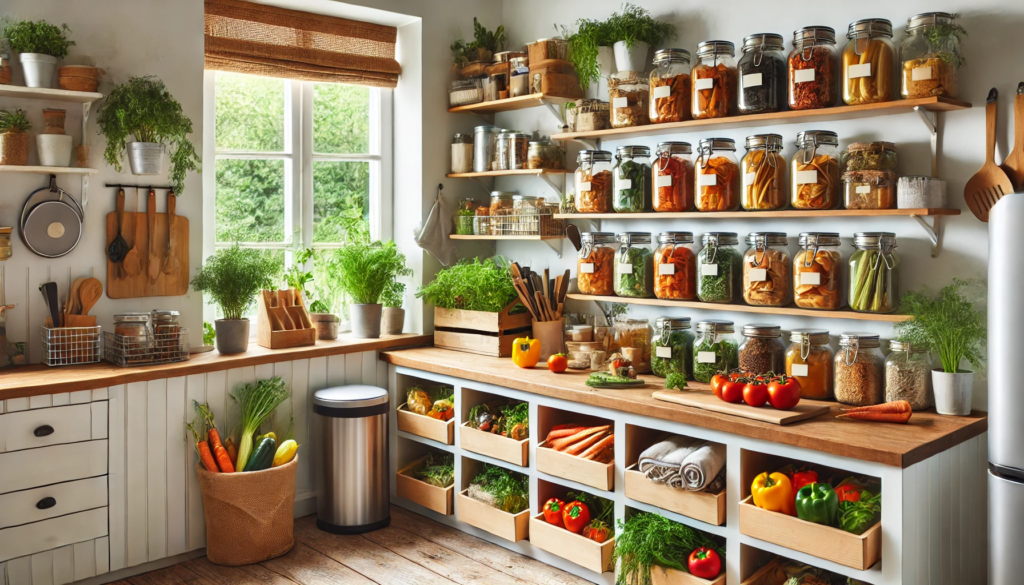Your cart is currently empty!

How to Reduce Food Waste: Practical Tips for a Sustainable Kitchen

Food waste is a growing issue, with millions of tons of edible food discarded each year. Reducing food waste isn’t just good for the environment—it can also save you money and help you eat more consciously.
1. Plan Your Meals
One of the easiest ways to reduce food waste is by planning meals in advance. By creating a weekly meal plan, you can avoid buying excess food and ensure you use what you already have. Stick to a grocery list to avoid impulse buys, and plan meals around ingredients you already have in the fridge or pantry.
2. Store Food Properly
Proper storage is key to extending the life of your food. Learn which fruits and vegetables should be stored in the fridge (like leafy greens) and which do better on the counter (like bananas). Use airtight containers for grains, nuts, and seeds to keep them fresh for longer. If you know you won’t use certain items in time, freezing them is a great option to extend their shelf life.
3. Practice First In, First Out (FIFO)
Organize your fridge and pantry using the “First In, First Out” rule. Place older food at the front so you use it first, and move newer purchases to the back. This will help prevent forgetting about items and letting them spoil.
4. Repurpose Leftovers
Get creative with leftovers! Instead of tossing out uneaten food, turn it into something new. Leftover roasted vegetables can be added to a salad or a soup, while stale bread can be transformed into croutons or breadcrumbs. Meal prepping and batch cooking can help you use all of your ingredients efficiently.
5. Compost Food Scraps
Even when food goes bad or leftovers aren’t salvageable, composting is a fantastic way to minimize waste. Composting organic materials like fruit and vegetable scraps, eggshells, and coffee grounds creates nutrient-rich compost that can be used for gardening. This not only reduces the amount of food waste sent to landfills but also helps enrich soil for future plant growth.
6. Buy “Ugly” Produce
Supermarkets often discard fruits and vegetables that don’t meet aesthetic standards, even though they are perfectly edible. Buy “ugly” produce, which is often sold at a discount, to help reduce this waste. Many grocery stores offer imperfect produce boxes, and some local farmers’ markets also sell less-than-perfect fruits and vegetables.
7. Make Stock from Scraps
Vegetable peels, herb stems, and bones from meat can all be used to make flavorful stocks and broths. Instead of throwing these scraps away, collect them in a freezer bag and make a homemade broth when you have enough. This simple practice can turn waste into a delicious base for soups, stews, and sauces.
8. Track What You Waste
Keeping track of what you throw away can help you become more mindful of your food consumption habits. Write down what food is wasted in your household and identify any recurring patterns. This will help you understand where you can cut back and make smarter purchasing decisions.
9. Donate Extra Food
If you find yourself with excess food that you can’t use before it spoils, consider donating it. Many communities have food banks or organizations that accept fresh food donations. It’s a great way to help others while reducing waste.
10. Cook in Smaller Batches
Avoid cooking large amounts of food that you can’t finish. Start by making smaller portions, especially for meals that don’t reheat well. You can always make more if needed, but this approach prevents excess food from ending up in the trash.
The Benefits of Reducing Food Waste
- Environmental Impact: Reducing food waste decreases methane emissions from landfills and conserves resources used in food production, such as water and energy.
- Saves Money: Buying and using only what you need saves you from unnecessary grocery expenses.
- Healthier Eating Habits: By planning meals and using fresh ingredients, you’re more likely to eat balanced, nutritious meals.

Leave a Reply